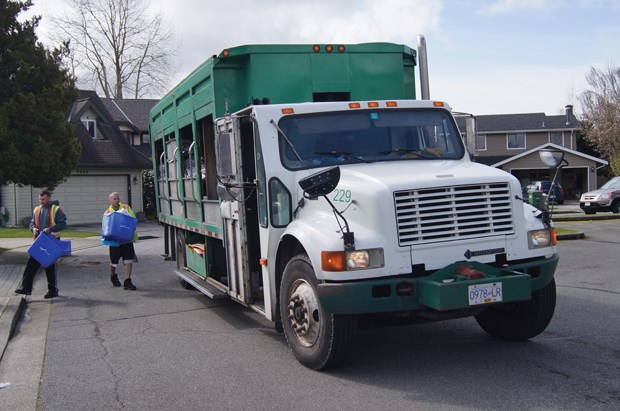So you’re finally getting used to putting food scraps in your green bin. And you’ve read about the new garbage cart pilot program. Well, cue the sad trombone sound effects; it’s time again for some more municipal recycling and waste management homework.
On May 19 the City of Richmond will effectively hand over responsibility for the collection and processing of paper and packaging to the newly formed and controversial non-profit provincial residential recycling stewardship organization Multi-Material British Columbia (MMBC).
Don’t flip to the sports section just yet.
The change will mean a new way of sorting a greater number of recyclable materials. It could have an adverse effect on certain recycling companies and businesses, and how it will benefit the environment is anyone’s guess at the moment.
The now customary yellow and blue bags will become relics of a not too distant past, to be phased out by a single bag, of a colour yet to be determined, where you will place all paper products.
However, you will now be tasked to sort glass containers, for which you will receive a new small bin, potentially grey in colour.
Within your existing blue bin you will place the usual plastic items and metal cans as well as new items that were once not accepted curbside such as aerosol containers, plastic garden pots, milk cartons, waxed items and drink cups.
“The key message is, from the homeowners standpoint, they will be able to greatly expand the number of materials that they can recycle,” said city spokesperson Ted Townsend.
The changes are a result of new provincial recycling regulations that force producers to pay for recycling their packaging. MMBC is largely the result of major corporations such as Apple, McDonald’s and Nestle creating a single stewardship program in order to collect and recycle the materials they sell.
Plan aims to increase incentive
The theory is businesses will have greater incentive to reduce materials and governments will no longer be responsible for recycling them.
The businesses will pay MMBC to collect and process the materials. In Richmond’s case, that money will then be sent to the city to operate its recycling program.
It’s a departure from having to ask taxpayers to fund collection and processing. Currently, a single-family home is charged about $43 by the city for recycling annually (this includes other city recycling services). Soon, MMBC will credit the city $38.50 per household. The city projects it will receive $2.3 million annually from MMBC. That new money will then pay the bills for curbside collection (Richmond’s contract with Sierra Waste Services remains intact).
Townsend said various factors could cut into the MMBC payment.
As MMBC has designated its own processing facilities hauling distances could be longer and the city has chosen to continue (non-deposit) glass pick-up (not being done voluntarily by MMBC). There are also contamination charges of up to $120,000 annually, hence the need for educating residents.
Townsend said where the existing utility charges go is up to city councilors, who were all contacted by the News, with two responding.
Coun. Bill McNulty said he would like to see the money diverted to the city’s sustainability programs. Coun. Linda McPhail opted for a wait and see approach.
Fees may be passed to consumers
Many in the recycling industry believe corporations and businesses will pass on the MMBC charges to consumers.
“The fees will likely mean producers charging more at the counter,” said Corinne Atwood, executive director of the BC Bottle and Recycling Association, which is part of a coalition of organizations opposed to MMBC’s apparent monopoly on paper and packaging recycling.
The organizations formed a campaign called RethinkItBC.
Atwood also said the depots are not being paid enough by MMBC to accept the materials MMBC will not, such as glass and styrofoam. The depots were strongarmed to sign contracts, said Atwood.
MMBC executive director Allen Langdon said glass contaminates other recyclables and accounts for just three per cent of all packaging, while styrofoam breaks too easily in the collection process.
Newspaper companies are also opposed to the 20 cents per kilogram charge implemented by MMBC (other provincial programs cost mere pennies per kilogram as a result of subsidies).
“The newspapers had two years to plan for this change,” said Langdon, saying they could have formed their own program.
Matt Torgenson, spokesperson for the Waste Management Association of BC, said little consultation was done with small recycling companies. He said MMBC's contracts are too onerous (such as 180 day termination clauses) and the program will essentially create conglomerates of collectors and processors effectively stifling innovation.
Townsend said the city had to negotiate lower contamination penalties and the agreement is reviewable
"It's safe to say it’s a work in process," he said.
The entire point of recycling is, of course, to save the environment.
Jay Ritchlin, biologist and director general for Western Canada for the David Suzuki Foundation, said lack of independent oversight of the program could affect how B.C. is able to examine recycling statistics and progress.
Ritchlin said Metro Vancouver has ambitious waste diversion goals. Presently the region diverts 58 per cent of all waste. Once a regional landfill ban on organics is in place by 2015 it hopes to reach 80 per cent diversion by 2020.



